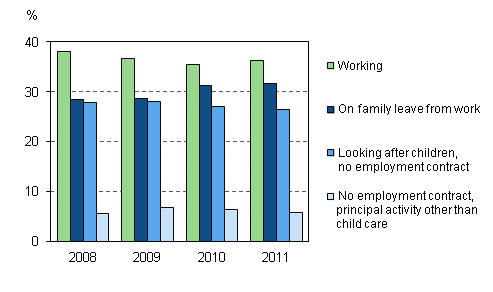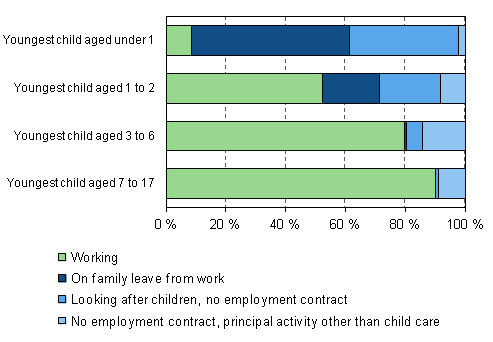Published: 11 September 2012
Mothers' use of family leaves has become slightly more general
According to the Labour Force Survey of Statistics Finland, the economic downturn that started at the end of 2008 was reflected in the employment of mothers of small children. The share of mothers on family leaves grew slightly and correspondingly, that of working mothers diminished somewhat between 2008 and 2010. The situation in 2011 has remained more or less the same as in 2010. These data derive from the annual Labour Force Survey review Families and work in 2011.
Working and family leaves of 20 to 59-year-old mothers with children aged under three in 2008-2011

In 2011, over one-third of mothers of children aged under three were working and nearly one-third were on family leaves from work. Good one-quarter were taking care of their children at home without an employment contract.
However, mothers do not stay long at home to look after their children. Ninety per cent of the mothers of school-age children were working, which is almost the same as for fathers. When the youngest child is one to two years old, more than one half of the mothers are working. In fact, just eight per cent of the mothers whose youngest child was aged under one were working.
Working and family leaves among 20 to 59-year-old mothers by age of their youngest child in 2011-2009

The concept 'working' used in this release differs from the concept of employed used in the Labour Force Survey. In the Labour Force Survey, persons on maternity or paternity leave from work as well as persons on other family leaves whose absence from work has lasted under three months are also classified as employed. Therefore, especially in the case of mothers of very small children the employed contain plenty of mothers who are actually at home looking after a child. The annual publication Families and work in 2011 is based on the household section of the Labour Force Survey.
Links
Updated tables of the Labour Force Survey: http://tilastokeskus.fi/til/tyti/tau_en.html .
Changes in employment and employment relationships in 2011 are described in an earlier Labour Force Survey annual review Employment and unemployment in 2011
Source: Labour Force Survey 2011. Statistics Finland
Inquiries: Heidi Melasniemi-Uutela 09 1734 2523, Tarja Nieminen 09 1734 3561, tyovoimatutkimus@stat.fi
Director in charge: Riitta Harala
Publication in pdf-format (439.3 kB)
- Reviews
-
- 1. Introduction (11.9.2012)
- 2. Employment of fathers and mothers remained almost unchanged during the economic downturn (11.9.2012)
- 3. Mothers use of family leaves has become slightly more widespread (11.9.2012)
- 4. More mothers stay at home after the arrival of third child (11.9.2012)
- 5. Both parents of families with children are usually employed (11.9.2012)
- 6 Concepts (11.9.2012)
- 7. The household section of the Labour Force Survey provides data on employment in families (11.9.2012)
- Tables
-
Tables in databases
Pick the data you need into tables, view the data as graphs, or download the data for your use.
Appendix tables
- Appendix table 1. Employment rates by age of youngest child 2010 - 2011, population aged 20-59 (11.9.2012)
- Appendix table 2. Employment rates by number of children 2010 - 2011, population aged 20-59 (11.9.2012)
- Appendix table 3. Activity rates by age of youngest child 2010 - 2011, population aged 20-59 (11.9.2012)
- Appendix table 4. Activity rates by number of children 2010 - 2011, population aged 20-59 (11.9.2012)
- Appendix table 5. Unemployment rates by age of youngest child 2010 - 2011, population aged 20-59 (11.9.2012)
- Appendix table 6. Unemployment rates by number of children 2010 - 2011, population aged 20-59 (11.9.2012)
- Quality descriptions
-
- Quality Description: Labour force survey (11.9.2012)
Updated 11.9.2012
Official Statistics of Finland (OSF):
Labour force survey [e-publication].
ISSN=1798-7857. Families and work in 2011 2011. Helsinki: Statistics Finland [referred: 19.4.2025].
Access method: http://stat.fi/til/tyti/2011/14/tyti_2011_14_2012-09-11_tie_001_en.html

